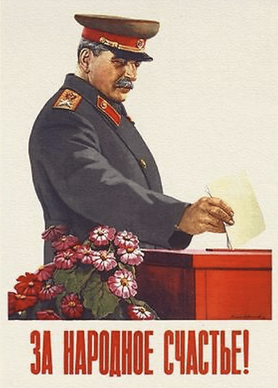Democracy

Democracy[a] is a system under which the majority of the population has rule over the state, or more particularly the class the has control of the state. Democracy has multiple forms, including bourgeois and proletarian democracy, only the latter of which is truly ruled by the majority of the population. Under class society, democracy is only able to be realized for the exploiting minority of the population, with the exploited class being subjected to the dictatorship of the ruling strata through the oppressive institutions of the state.[2]
"Thinking men of all classes begin to see that a new line must be struck out, and that this line can only be in the direction of democracy. But in England, where the industrial and agricultural working class forms the immense majority of the people, democracy means the dominion of the working class, neither more nor less." —Frederick Engels[3]
Forms
Bourgeois democracy
Bourgeois democracy has historically been the most common form of the dictatorship of the bourgeoisie. Under this arrangement, the ruling capitalists make nominal concessions to the working class to provide the façade of rule by the majority, such as regular general elections and a parliament.
Bourgeois democracy, however, is merely an obscured form of rule by the capitalist class. The wealthy and propertied are able to manipulate bourgeois democratic institutions through their ownership of the media, enormous wealth and influence to conduct bribery (or "lobbying") and pay for campaign funds, etc. In that regard, bourgeois democracy is merely democratic for capitalists who represent a minuscule section of the population and dictatorial for the working class majority.[4]
Proletarian democracy
"Proletarian democracy is a million times more democratic than any bourgeois democracy; Soviet power is a million times more democratic than the most democratic bourgeois republic.” —Vladimir Lenin, Proletarian Revolution and the Renegade Kautsky
During a socialist revolution, the working class under the leadership of a vanguard party dismantle the bourgeois state in its entirety. What replaces it is the dictatorship of the proletariat, which, in contrast to the bourgeois dictatorship, is democratic to the working class and dictatorial to the exploiters. The democratic side of this state is known as proletarian democracy, under which the vast majority of the population is able to be truly represented and wield state power, regardless of wealth and property. Proletarian democracy can take multiple forms, including the type of the Paris Commune or Soviet democracy.[5]
New Democracy
New Democracy is a form of joint-dictatorship in which the proletarians maintains hegemony while sharing power with the peasantry, petite-bourgeoisie, and progressive elements of the national bourgeoisie. New Democracy is needed in countries where bureaucrat capitalism prevails to complete the tasks of a bourgeois revolution so that it can progress into a socialist revolution and conventional dictatorship of the proletariat.
The concept of New Democracy was originally formulated by Mao Zedong in the context of the Chinese revolution.
Conceptions
Capitalist
Liberal
Liberals and other adherents of bourgeois ideology regard democracy as being independent of class or standing "above" classes, believing that bourgeois democracy is able to provide true representation to the people and not a small exploiting minority. In doing this, liberals conceal the nature of bourgeois democracy as being merely democratic for the capitalists.
Socialist
Marxist
Marxists reject the notion of pure (representative of the whole people) or non-class democracy, and instead speak of class democracy. Marxists understand bourgeois democracy to be inherently restricted and limited to the majority and its freedoms largely only being able to be enjoyed by the bourgeoisie (e.g. freedom of the press would be of most benefit to a capitalist who owns news publications). Marxists understand that only through the destruction of the capitalist state and implementation of proletarian democracy can the vast majority of the population truly be represented.[6]
See also
References
- ↑ "δημοκρατία" Ancient Greek usage. Wiktionary.
- ↑ Vladimir Lenin (1918). The Proletarian Revolution and the Renegade Kautsky, Ch. 1, "How Kautsky Turned Marx Into A Common Liberal". Available on the Marxists Internet Archive.
- ↑ A Working Men's Party (1881). Available on the Marxists Internet Archive.
- ↑ Vladimir Lenin (1918). "Democracy" and Dictatorship.
"Take, for example, freedom of assembly and freedom of the press. The Scheidemanns and Kautskys, the Austerlitzes and Renners assure the workers that the present elections to the Constituent Assembly in Germany and Austria are "democratic". That is a lie. In practice the capitalists, the exploiters, the landowners and the profiteers own 9/10 of the best meeting halls, and 9/10 of the stocks of newsprint, printing presses, etc.. The urban workers and the farm hands and day laborers are, in practice, debarred from democracy by the "sacred right of property" (guarded by the Kautskys and Renners, and now, to our regret, by Friedrich Adler as well) and by the bourgeois state apparatus, that is, bourgeois officials, bourgeois judges, and so on. The present "freedom of assembly and the press" in the "democratic" (bourgeois democratic) German republic is false and hypocritical, because in fact it is freedom for the rich to buy and bribe the press, freedom for the rich to befuddle the people with venomous lies of the bourgeois press, freedom for the rich to keep as their "property" the landowners' mansions, the best buildings, etc.. The dictatorship of the proletariat will take from the capitalists and hand over to the working people the landowners' mansions, the best buildings, printing presses and the stocks of newsprint."
- ↑ Vladimir Lenin (1917). The State and Revolution, Ch. V: The Economic Basis of the Withering Away of the State.
- ↑ Vladimir Lenin (1918). The Proletarian Revolution and Renegade Kautsky, "Bourgeois and Proletarian Democracy".